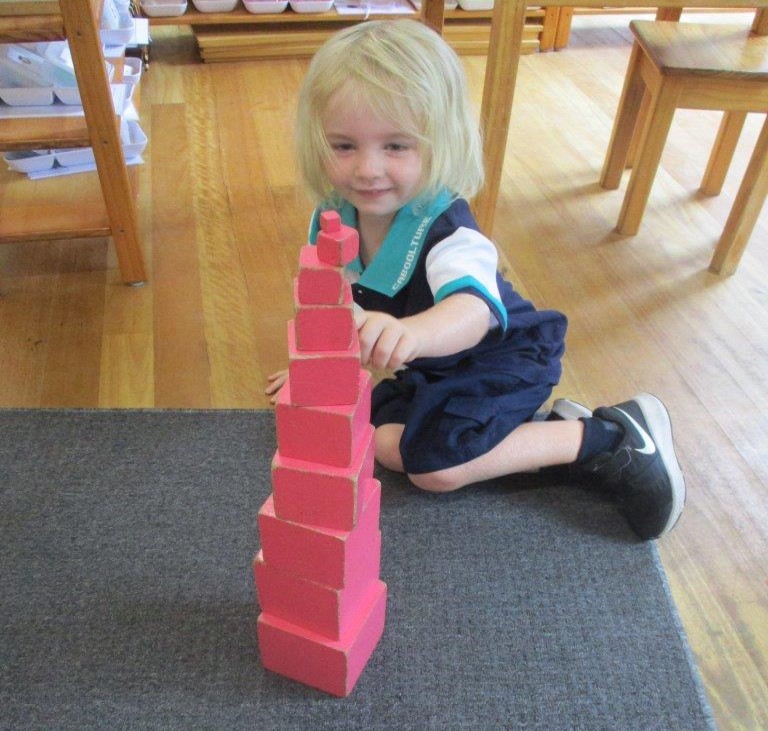
Montessori Early Learning Years
Brain Development
Did you know that enhanced learning experiences during your child’s early years (age 1-3) are vital for optimal brain development? (Rushton, 2011). During this time your child is absorbing anything and everything at phenomenal rates. We often hear the phrase ‘soaking it all up‘! It’s true! In seeing, touching, smelling, hearing, feeling, your child’s brain is absorbing information. There is no discrimination in what he/she wants to learn. They just want to learn!
Brain architecture begins with a simple map which quickly shows many connections and neural pathways. By the time your baby is two months old, they have already stored much information subconsciously which transforms into understanding with every-day practice. By age 3, your toddler has at least 1 trillion connections and is developing further. Since birth, the brain has now increased four-fold in size and has reached approximately 90% of adult volume.
Dr. Maria Montessori, founder of the Montessori method of education, stated that the potential of children aged 1-3 is ‘vastly underestimated’, (The Discovery of the Child, M Montessori, 1967). She stated that a ‘prepared environment would foster needs and desires of the young learner’. So, in order to provide deeper learning opportunities, she provided strategically prepared environments for children of this age. She noticed how they learned to focus deeply in these prepared environments, which were organized to accommodate movement, communication, order and independent functioning. This combined, multi-faceted and multi-dimensional way of learning stays with your early learner for life, and that’s why quality education in the early years of childhood is massively significant for your child.
Caboolture Montessori School – encouraging choice
At Caboolture Montessori School, the Early Learning children are given choices of moving freely and respectfully in a communal space with other children, and choice of what they wish to learn. This may sound strange to parents, however, activities in their environment are pre-prepared to encourage formation of concepts in a graded and sequential manner. Unlike contemporary schooling, your child is presented with a number of choices to allow their individual interest to guide their learning. When you as an adult are presented with choices, you have to think about it, and this is no different for your child. Unfortunately, sometimes adults and parents, we remove that vital element of choice from them, without realizing how important it is. This is understandable, however the environment of choice is highly respected in Montessori and continues from the toddler environment right into the 3-6 year old space, building on the previously gained knowledge. Therefore, this provide a highly customised learning environment that is directed by your child. When your child chooses what (s)he wants to learn, motivation to learn increases significantly, focus is deepened and a myriad of behavioural issues are avoided. This is a key concept of Montessori learning.
Montessori’s love of learning

When your child touches items of different sizes, texture, colours – they are feeding their developing brains. Sometimes, we as adults do not realise how much learning is going on at this time of your child’s life. We see them holding a pencil and wonder what’s so special about it? We know what a pencil is, but we forget that they are learning to grip it; they are learning about the shape and how it feels; they are observing the colour; they are wondering about how it tastes! And that’s just for starters. Their curiosity is endless and it is this drive to learn that Montessori aims for each child to keep throughout their education. Even at the age of 1-3 years old, modern and curricular aligned subjects such as geometry, art, music, grammar and more are taught effectively in a concrete form, ie through materials that we know as Montessori manipulatives. The adults (teachers, supporters, parents, grandparents) are observers and guides. Their role is to connect and know the individual child deeply so that both parties become attuned to what is needed and what can be avoided. Both the family and school support the child’s learning and overall human development by providing the child agency over who they are and ultimately who they will become. This is Dr. Montessori’s vision and it’s what makes Montessori learning different. If you would like to read more about Dr. Maria Montessori, please visit here.
The best way to find out more about those valuable Early Learning years is to register here for our upcoming Open Day. We look forward to welcoming you.
